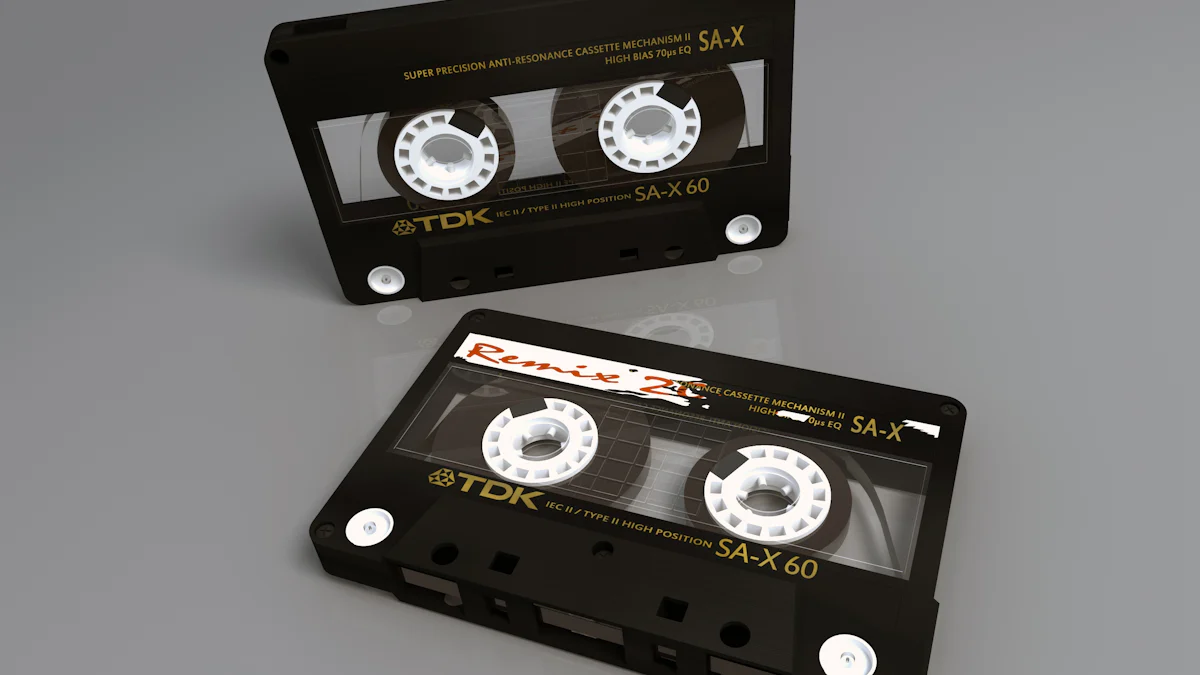


Data storage technologies have evolved over the years, offering various solutions for different needs. Tape Drive stands out as a traditional yet highly relevant option. You might wonder why this old-school technology still matters today. Tape Drives offer large capacity, cost-effectiveness, and longevity. Tapes can last for decades if stored properly. This makes them ideal for archival purposes. Businesses use Tape Drives for data backup and disaster recovery because of their offline nature and security features. Understanding Tape Drives helps you make informed decisions in modern data management.
Understanding Tape Drive
Definition and Basic Concepts of Tape Drive
What is a Tape Drive?
A Tape Drive is a device that stores data on magnetic tape. Businesses use it for backup and archiving. This technology offers high capacity and long-term storage. Tape Drives provide a secure way to keep data offline. This makes them less vulnerable to cyber threats.
How Tape Drives Work
Tape Drives read and write data sequentially. The tape moves over a read/write head. This process allows data to be stored efficiently. Advanced techniques like multilevel forward error correction ensure data integrity. The linear serpentine layout helps in organizing data on the tape.
Types of Tape Drive
Linear Tape-Open (LTO)
Linear Tape-Open (LTO) is a popular format. LTO technology provides high capacity and fast data transfer rates. Businesses use LTO for its reliability and scalability. The technology continues to evolve, offering better performance with each generation.
Digital Linear Tape (DLT)
Digital Linear Tape (DLT) is another type. DLT offers robust data protection features. This format is known for its durability and transportability. Many industries rely on DLT for secure and efficient data storage.
Historical Context of Tape Drive
Evolution of Tape Drives
Tape Drive technology has a rich history that dates back to the early days of computing. Magnetic tape, the medium used in these devices, first appeared in the 1920s. Early magnetic records were bulky and prone to errors. However, they underwent significant transformations over the decades. The IBM 729 Magnetic Tape Unit, released in 1952, stands as a notable example of early tape drive technology. This unit marked a significant leap in data storage capabilities.
The journey from analog to digital dominance showcases human ingenuity. Tape Drives evolved to meet the growing demand for efficient and reliable data storage solutions. Innovation in this field never ceased. What was once cutting-edge technology continues to play a crucial role in the sustainability of data storage.
Role in Data Storage History
Tape Drives have played a pivotal role in the history of data storage. During the 20th century, these devices became indispensable for businesses and institutions. Tape Drives offered a practical solution for storing large volumes of data. Companies relied on them for backup and archiving purposes. The offline nature of Tape Drives provided an added layer of security against data breaches.
The transition to modern usage saw Tape Drives adapt to new challenges. Despite the rise of disk drives and cloud storage, Tape Drives retained their relevance. They offered unique advantages such as cost-effectiveness and longevity. Businesses continue to use Tape Drives for their archival needs. The ability to store data securely for extended periods remains unmatched.
Comparing Tape Drive with Other Storage Technologies

When you think about data storage, Tape Drive, Hard Disk Drives (HDD), and Solid State Drives (SSD) come to mind. Each has unique features that make them suitable for different needs. Let's dive into how Tape Drives stack up against HDDs and SSDs.
Tape Drives vs. Hard Disk Drives (HDD)
Cost Comparison
Tape Drives often win the cost battle. Businesses looking to store large amounts of data for a long time find Tape Drives more affordable. HDDs offer direct access storage, but the cost can add up when you need to store vast amounts of data. Tape Drives allow you to save money while meeting your storage needs.
Reliability and Durability
Reliability is crucial in data storage. Tape Drives excel here. The sequential access nature of Tape Drives means fewer moving parts, reducing wear and tear. HDDs have rotating disks, which can fail over time. Tape Drives provide a durable option for long-term data retention.
Tape Drives vs. Solid State Drives (SSD)
Speed and Performance
SSDs shine in speed and performance. Data retrieval happens quickly with SSDs due to flash memory. Tape Drives, on the other hand, offer sequential access. This means Tape Drives might not be the best choice if you need rapid data access. However, for archival purposes, Tape Drives perform well.
Use Cases and Applications
Tape Drives serve specific needs. Businesses use Tape Drives for backup and archiving. The large capacity of Tape Drives makes them ideal for storing significant data volumes. SSDs work well for applications requiring fast access and frequent data retrieval. Tape Drives provide a secure and cost-effective solution for long-term storage.
Tape Drives remain relevant in today's data storage landscape. Understanding the strengths and limitations of Tape Drives helps you make informed decisions. Whether you prioritize cost, reliability, or performance, Tape Drives offer a viable option for many storage scenarios.
Advantages of Tape Drive
Cost-Effectiveness
Long-Term Storage Costs
Tape Drive technology offers a budget-friendly solution for data storage. Businesses often seek ways to cut costs without sacrificing quality. Tape Drives provide an affordable option. The cost per gigabyte is lower compared to disk or cloud backups. This makes Tape Drives ideal for storing large volumes of data over time. Companies can allocate resources more efficiently by choosing Tape Drives.
Energy Efficiency
Energy efficiency plays a crucial role in modern data management. Tape Drives consume less power than other storage technologies. This leads to reduced energy bills and a smaller carbon footprint. Organizations aiming for sustainability find Tape Drives appealing. The energy savings contribute to the overall cost-effectiveness of Tape Drives.
Reliability and Longevity
Data Integrity
Data integrity remains a top priority for any business. Tape Drives excel in maintaining data accuracy and security. The offline nature of Tape Drives protects data from cyber threats. This makes Tape Drives a reliable choice for storing sensitive information. Companies can trust Tape Drives to safeguard their valuable data assets.
Lifespan of Tape Media
The lifespan of Tape Media surpasses many other storage options. Tapes can retain data for over 20 years when stored properly. This longevity ensures that archived information remains accessible. Businesses benefit from the durability of Tape Drives. The extended lifespan reduces the need for frequent replacements.
Tape Drives continue to prove their worth in data storage. The combination of cost-effectiveness, reliability, and longevity makes Tape Drives a smart choice. Businesses looking to optimize their storage strategies should consider Tape Drives. The advantages offered by Tape Drives align with the needs of modern enterprises.
Challenges and Limitations of Tape Drive
Access Speed
Sequential Access Nature
Imagine needing to find a specific file on a Tape Drive. You can't just jump straight to it like you would with a hard drive. Tape Drives work in a sequential manner. The tape has to wind through until it reaches the right spot. This process takes time. For tasks requiring quick access, Tape Drives might not be the best fit. Businesses often use Tape Drives for archiving where immediate access isn't crucial. Sequential access suits long-term storage needs but not rapid retrieval.
Impact on Data Retrieval
The sequential nature impacts how fast you can get your data. If you need to retrieve something quickly, Tape Drives might slow you down. Data retrieval from Tape Drives involves waiting for the tape to move to the correct position. This delay can be frustrating if speed is essential. However, for archival purposes, this isn't usually a problem. Tape Drives excel in storing large amounts of data securely over time. The trade-off is slower access when you need that data back.
Physical Storage Requirements
Space Considerations
Tape Drives require physical space for storage. Unlike digital storage solutions, Tape Drives need a place to keep the tapes. Businesses must plan for this when choosing Tape Drives. The tapes themselves are compact, but you'll need a system to organize them. Proper storage ensures the longevity of the tapes. Companies often dedicate specific areas for Tape Drive storage. This setup helps maintain order and accessibility.
Maintenance Needs
Maintaining Tape Drives involves regular checks. You need to ensure the tapes remain in good condition. Dust and environmental factors can affect Tape Drive performance. Regular cleaning and maintenance help keep Tape Drives running smoothly. Businesses should establish a routine for checking Tape Drives. This practice prevents data loss and extends the life of the tapes. Proper care ensures Tape Drives continue to serve your storage needs effectively.
Tape Drives offer unique benefits but come with challenges. Understanding these limitations helps you decide if Tape Drives fit your storage strategy. Whether it's the need for physical space or slower access speeds, Tape Drives require careful consideration. Businesses looking for reliable, long-term storage often find Tape Drives a valuable option.
Real-World Applications of Tape Drive

Tape Drive technology finds its place in various industries. Each sector leverages the unique benefits of Tape Drives to meet specific data storage needs. Let's explore how different industries utilize Tape Drives effectively.
Industries Utilizing Tape Drives
Media and Entertainment
The media and entertainment industry relies heavily on Tape Drives. This sector generates massive amounts of data daily. High-definition videos, audio files, and digital content require secure storage solutions. Tape Drives offer large capacity and durability, making them ideal for archiving media assets. Studios and production houses use Tape Drives to store raw footage and completed projects. The offline nature of Tape Drives ensures data security and longevity. Tape Drives provide a cost-effective solution for managing extensive media libraries.
Financial Services
Financial services also benefit from Tape Drive technology. Banks and financial institutions handle sensitive data that requires secure storage. Tape Drives offer a reliable way to archive transaction records and customer information. The long lifespan of Tape Media ensures data remains accessible for regulatory compliance. Tape Drives protect data from cyber threats due to their offline nature. Financial institutions trust Tape Drives for disaster recovery and backup purposes. The energy efficiency of Tape Drives aligns with sustainability goals in this sector.
Case Studies
Real-world examples highlight the effectiveness of Tape Drives in various applications. These case studies demonstrate successful implementations and valuable lessons learned.
Successful Implementations
Case Study: XYZ Media Group
XYZ Media Group faced challenges in managing its growing digital content library. The company implemented Tape Drives to archive high-definition video files. Tape Drives provided the necessary capacity and security for long-term storage. XYZ Media Group reduced storage costs by 30% using Tape Drives. The company ensured data integrity and accessibility for future projects.
Case Study: ABC Financial Services
ABC Financial Services needed a secure backup solution for sensitive customer data. The institution adopted Tape Drives for their reliability and offline storage capabilities. Tape Drives helped ABC Financial Services comply with data retention regulations. The company achieved a 40% reduction in energy consumption by switching to Tape Drives. Data protection improved significantly with the implementation of Tape Drives.
Lessons Learned
Tape Drives offer unmatched durability and security for archival purposes. Businesses learned that Tape Drives excel in storing large volumes of data over time. Companies realized the importance of regular maintenance to ensure optimal performance. Proper storage and organization of tapes proved crucial for easy access and data integrity. Tape Drives continue to play a vital role in modern data management strategies.
Tape Drive technology remains relevant across industries. Understanding real-world applications helps you appreciate the versatility of Tape Drives. Whether in media, finance, or other sectors, Tape Drives provide valuable solutions for data storage challenges.
Future of Tape Drive
Technological Innovations
Emerging Trends
Tape drives keep evolving. New trends show tape drives getting faster and storing more data. Modern tape cartridges now hold terabytes and even petabytes. This means tape drives can handle massive data needs. Fast data transfer rates let you finish big backups quickly. This speed helps keep tape drives relevant in today's fast-paced world.
Potential Developments
The future looks bright for tape drives. Technology keeps pushing boundaries. You might see tape drives with even more storage capacity soon. Innovations could make tape drives even more energy-efficient. This would appeal to businesses focused on sustainability. Tape drives might also become more user-friendly. This would make them easier for everyone to use.
Continued Relevance
Role in Data Archiving
Tape drives play a big role in data archiving. Businesses need to store important information for a long time. Tape drives offer a reliable solution. The offline nature of tape drives keeps data safe from cyber threats. This makes tape drives a trusted choice for secure storage. Companies can count on tape drives to protect valuable data assets.
Adaptation to New Challenges
Tape drives adapt well to new challenges. The digital world changes fast. Tape drives keep up by offering cost-effective storage solutions. Businesses face competition from SSDs and cloud storage. Tape drives stand out by providing durability and versatility. Organizations trust tape drives for data security and long-term storage. Tape drives continue to be a key part of modern data management strategies.
Tape drives offer a dependable and cost-effective solution for data storage. You can rely on their large capacity and long lifespan for critical information archiving. Businesses find tape drives ideal for backup and disaster recovery due to their security features. Consider tape drives for specific storage needs where durability and reliability matter. Explore this technology further to understand its benefits in modern data management. Tape drives continue to play a vital role in safeguarding valuable data assets.
FAQ
Tape drives have shown reliability over decades. Businesses trust them for their durability and stability. Tape drives offer a dependable solution for long-term [
](https://www.fanruan.com/en/glossary/big-data/data-preservation). The offline nature of tape drives protects data from cyber threats. This makes them a secure choice for sensitive information.
Tape drives excel in storing data for lengthy periods. Unlike hard disks, tape cartridges last for decades. Businesses find tape drives ideal for historical documents and scientific data. The longevity of tape drives ensures that information remains accessible over time.
Modern tape drives have fast data transmission rates. This allows large backups to finish quickly. Tape drives minimize downtime in critical situations. Businesses appreciate the speed of modern tape drives for efficient data management.
Tape drives offer several benefits:
High capacity for large data volumes
Low cost compared to other storage options
Long lifespan for secure data retention
Transportability for easy data movement
Security against cyber threats
Reliable disaster recovery solutions
Tape drive technology has progressed from basic analog systems to complex digital solutions. Advances in software and hardware have fueled this evolution. Tape drives continue to play a vital role in data storage and security measures. Businesses rely on tape drives for their dependable performance.
Tape drives will continue to evolve with technology. Expect more storage capacity and energy efficiency. Businesses focused on sustainability will find tape drives appealing. Tape drives will remain relevant in a data-driven society. The adaptability of tape drives ensures their importance in modern data management strategies.
Continue Reading About Tape Drive
How to Craft an Effective Analytics Dashboard
Craft an effective analytics dashboard to track metrics and optimize business processes with actionable insights.
Lewis
Nov 15, 2024
2025 Best Data Integration Solutions and Selection Guide
Explore top data integration solutions for 2025, enhancing data management and operational efficiency with leading platforms like Fivetran and Talend.
Howard
Dec 19, 2024
2025's Best Data Validation Tools: Top 7 Picks
Explore the top 7 data validation tools of 2025, featuring key features, benefits, user experiences, and pricing to ensure accurate and reliable data.
Howard
Aug 09, 2024
Best Data Integration Platforms to Use in 2025
Explore the best data integration platforms for 2025, including cloud-based, on-premises, and hybrid solutions. Learn about key features, benefits, and top players.
Howard
Jun 20, 2024
Best Data Integration Vendors for Seamless Workflows
Discover the top 20 data integration vendors of 2025 for seamless workflows. Compare tools like Talend, AWS Glue, and Fivetran to optimize your data processes.
Howard
Jan 22, 2025
Best Data Management Tools of 2025
Explore the best data management tools of 2025, including FineDataLink, Talend, and Snowflake. Learn about their features, pros, cons, and ideal use cases.
Howard
Aug 04, 2024


